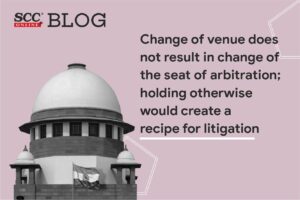Supreme Court: The bench of Ajay Rastogi and Sanjiv Khanna*, JJ has held that subsequent hearings or proceedings at a different location other than the place fixed by the arbitrator as the ‘seat of arbitration’ should not be regarded and treated as a change or relocation of jurisdictional ‘seat’.
The Court was deciding the question as to whether conducting the arbitration proceedings at Delhi, owing to the appointment of a new arbitrator, would shift the ‘jurisdictional seat of arbitration’ from Panchkula in Haryana, the place fixed by the first arbitrator for the arbitration proceedings in the case at hand.
Fixed seat of arbitration – General Principle
In order to avoid uncertainty and confusion resulting in avoidable esoteric and hermetic litigation as to the jurisdictional ‘seat of arbitration’, the Court observed that ‘the seat’ once fixed by the arbitral tribunal under Section 20(2) of the Arbitration and Conciliation Act, 1996, should remain static and fixed, whereas the ‘venue’ of arbitration can change and move from ‘the seat’ to a new location. Venue is not constant and stationary and can move and change in terms of sub-section (3) to Section 20 of the Act.
“Once the jurisdictional ‘seat’ of arbitration is fixed in terms of sub-section (2) of Section 20 of the Act, then, without the express mutual consent of the parties to the arbitration, ‘the seat’ cannot be changed. Therefore, the appointment of a new arbitrator who holds the arbitration proceedings at a different location would not change the jurisdictional ‘seat’ already fixed by the earlier or first arbitrator. The place of arbitration in such an event should be treated as a venue where arbitration proceedings are held.”
The Court observed that it is highly desirable in commercial matters, in fact in all cases, that there should be certainty as to the court that should exercise jurisdiction. The law of arbitration visualises repeated or constant shifting of the ‘seat of arbitration’. In fact, sub-section (3) of Section 20 specifically states and draws a distinction between the venue of arbitration and the ‘seat of arbitration’ by stating that for convenience and other reasons, the arbitration proceedings may be held at a place different than the ‘seat of arbitration’, which location is referred to the venue of arbitration.
The Court held that holding otherwise would create a recipe for litigation and (what is worse) confusion which was not intended by the Act. The place of jurisdiction or ‘the seat’ must be certain and static and not vague or changeable, as the parties should not be in doubt as to the jurisdiction of the courts for availing of judicial remedies. Further, there would be a risk of parties rushing to the courts to get first hearing or conflicting decisions that the law does not contemplate and is to be avoided.
Effect of supervisory jurisdiction by the courts
Further, exercise of supervisory jurisdiction by the courts where the arbitration proceedings are being conducted is a relevant consideration, but not a conclusive and determinative factor when the venue is not ‘the seat’. ‘The seat’ determines the jurisdiction of the courts. There would be situations where the venue of arbitration in terms of sub-section of 28 (3) of Section 20 would be different from the place of the jurisdictional ‘seat’, and it is equally possible majority or most of the hearing may have taken place at a venue which is different from the ‘seat of arbitration’.
Effect of substantive Proceedings being held at a different venue
There could be cases where the arbitration proceedings are held at different locations, but the ‘seat of arbitration’, as agreed by the parties or as determined by the arbitrator, may be different, and at that place – ‘the seat’, only a few hearings or initial proceedings may have been held. This would not matter and would not result in shifting of the jurisdictional ‘seat’. Arbitrators can fix the place of residence, place of work, or in case of recusal, arbitration proceedings may be held at two different places, as in the present case. For clarity and certainty, which is required when the question of territorial jurisdiction arises, the place or the venue fixed for arbitration proceedings, when sub-section (2) of Section 20 applies, will be the jurisdictional ‘seat’ and the courts having jurisdiction over the jurisdictional ‘seat’ would have exclusive jurisdiction. This principle would have exception that would apply when by mutual consent the parties agree that the jurisdictional ‘seat’ should be changed, and such consent must be express and clearly understood and agreed by the parties.
Conclusion
Applying the law to the case at hand, the Court held that the courts having jurisdiction over Panchkula in Haryana, have exclusive jurisdiction. The courts in Delhi would not get jurisdiction as the jurisdictional ‘seat of arbitration’ is Panchkula and not Delhi.
[BBR (India) Pvt. Ltd. v. SP Singla Constructions Pvt. Ltd., 2022 SCC OnLine SC 642, decided on 18.05.2022]
*Judgment by: Justice Sanjiv Khanna

